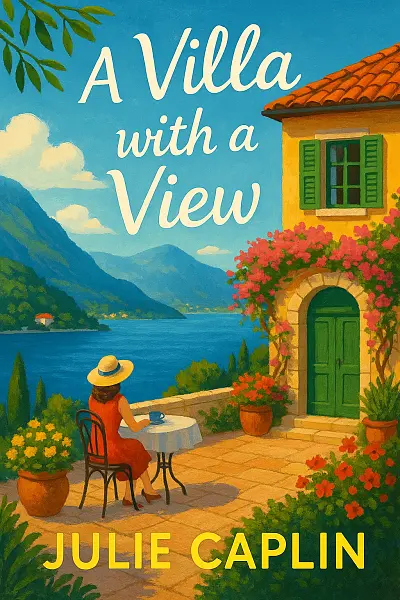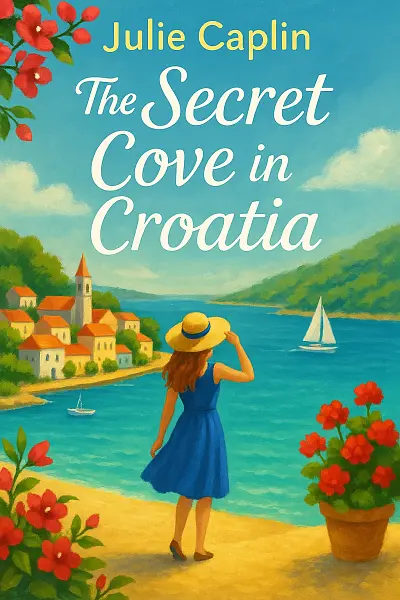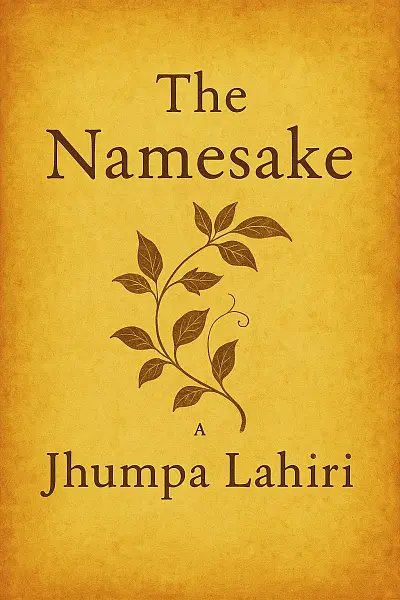
A Villa with a View
by: Julie Caplin
Lia Bathurst escapes to the dazzling Amalfi Coast, craving sun-soaked beaches and a fresh start. But her dreams take a wild detour when she discovers a father she never knew—and is promptly blocked at the villa gates by the frustratingly handsome Raphael Knight, her father’s loyal manager.
When Lia proves her claim, Raph’s suspicion keeps them close, every scorching day upping the emotional stakes. As fake smiles turn into lingering glances, they both risk their guarded hearts, forced to confront trust, family, and whether love can bloom from chaos.
The vibe absolutely sparkles—sun, sea, sizzling banter… but will they let love in?
"Sometimes the best views in life come not from where you stand, but from whom you choose to stand beside."
Let's Break This Down
The Author's Voice
Atmosphere
Light-soaked, sensory, and charmingly escapist
Julie Caplin paints Italy with a sun-dappled brush—expect cobbled streets, breezy terraces, and vineyard vistas that are practically cinematic. The vibe is pure feel-good vacation, with playful banter and sparkling air of possibility. Whether it’s the scent of espresso or the hush of an evening by the lake, the mood is lush and inviting, transporting you right into the heart of la dolce vita.
Prose Style
Easygoing, descriptive, and effervescent
Caplin’s writing is breezy and approachable, never heavy-handed. She peppers her prose with vivid, tactile details—every meal and moment is rich and immersive, but never purple. The dialogues feel fresh and lifelike, carrying a witty, flirtatious edge. Don’t look for literary flourishes—this is more about cozy, conversational storytelling than lyrical depth.
Pacing
Gentle, flowing, with a dash of slow-burn romance
The story unfolds at the pace of a lazy summer afternoon. There’s plenty of room for characters to breathe, explore, and connect; you’re rarely rushed, but things never grind to a halt either. The romance simmers rather than sprints, allowing chemistry to build naturally. If you love to luxuriate in setting and savor every twist of emotional development, you’ll feel right at home here.
Dialogue
Witty, flirtatious, and full of charm
Exchanges between characters sparkle—with Caplin’s signature blend of humor and sharp timing, conversations never feel stale. Banter pops like Prosecco, keeping relationships light and engaging, while heartfelt moments land with just the right touch of sincerity.
Character Development
Relatable, growth-focused, and emotionally honest
You’ll find characters grappling with real insecurities, making brave (and sometimes messy) choices in pursuit of happiness. Emotional arcs are well-drawn—secondary characters add warmth and complexity, never feeling like background props.
Overall Rhythm & Mood
Comforting, uplifting, and ripe for armchair travel
Perfect for readers who crave an immersive escape, Caplin’s style lulls you into a golden, hope-filled state. If you’re up for good-hearted romance, a sprinkle of self-discovery, and a postcard-worthy setting, this book is pure, feel-good indulgence.
Key Moments
- Sun-soaked breakfasts on the villa terrace—every meal a stage for secrets and slow-burn flirtation
- Nina’s whirlwind scooter ride through the hills—equal parts chaos and chemistry
- Riotous supporting cast: from meddling Nonna Lucia to a British bestie with zero filter
- Vivid, mouthwatering prose—Italy’s flavors practically leap off the page
- Emotional gut-punch: Nina confronting her past beneath the lemon trees
- Misunderstood texts and meddling locals spark rom-com chaos at sunset
- That moonlit confession scene—honest, raw, and totally worth the wait
Plot Summary
Julie Caplin's A Villa with a View whisks readers away to sun-drenched Italy, where champion chef Maddie Wilcox is sent to oversee a villa’s kitchen during a glamorous wedding season. Hoping for a fresh start after heartbreak, Maddie’s resolve is tested when she’s forced to work alongside the best man, formidable architect Alessandro Rossi, whose brusque demeanor hides his own emotional scars. Tensions between Maddie and Alessandro spark, leading to witty clashes and eventual closeness as secrets unravel—especially Alessandro’s struggles with family expectation and Maddie’s desire to prove herself outside others’ shadows. The story peaks at the big wedding, when Alessandro jeopardizes his relationship with Maddie by nearly repeating past mistakes, but eventually, honesty and vulnerability allow both characters to drop their guard. In the end, love, food, and family intertwine as Maddie and Alessandro choose one another, fully embracing their new beginnings.
Character Analysis
Maddie starts off as eager yet insecure, determined to chart her own path outside of her successful friends’ achievements. Throughout her journey, she grows—her confidence in the kitchen reflects her gradual comfort in expressing her true desires, especially with Alessandro. Alessandro, meanwhile, first appears arrogant and emotionally distant, but as his family's influence unravels, his softer side comes to light. Their dynamic is rich with banter and chemistry, shifting organically from antagonism to genuine trust and affection, with both ultimately learning that vulnerability is the heart of real connection.
Major Themes
One central theme is self-discovery, as both Maddie and Alessandro wrestle with forging their own identities outside familial or societal expectations. Belonging and home are also huge—Italy acts as a character in its own right, offering both healing and a sense of place. The story underscores the idea that authentic relationships require dropping pretenses—illustrated by the repeated motif of sharing meals as an act of honesty and care. Caplin also weaves in the theme of second chances; both lead characters must confront their past mistakes and allow themselves to love again.
Literary Techniques & Style
Caplin’s writing thrives on lush, sensory detail—vivid descriptions of food and scenery immerse you in villa life, practically letting you taste every dish Maddie prepares. She uses alternating perspectives between Maddie and Alessandro, giving readers intimate access to their evolving feelings and internal conflicts. Symbolism peppers the narrative, like the untamed garden Maddie restores (mirroring her own tumultuous growth), and metaphors drawn from Italian cuisine to express emotional states. Dialogue crackles with wit, keeping the tone breezy even as deeper themes are explored.
Historical/Cultural Context
Set in contemporary Italy, the novel revels in the cultural richness of the Amalfi Coast—from its culinary traditions to the close-knit, often meddlesome family structures that shape character motivations. The intersection of British and Italian customs is highlighted, especially in the expectations both Maddie and Alessandro face. Caplin also reflects modern anxieties around career versus personal life, filtered through an escapist, romantic lens that celebrates both independence and community.
Critical Significance & Impact
A Villa with a View is a standout in the feel-good romance genre, beloved for its evocative setting and relatable characters. While not groundbreaking, its blend of escapism, humor, and emotional depth has garnered a loyal following, especially among fans of character-driven, foodie-themed romances. The novel’s ultimate message—that courage and openness unlock both love and self-acceptance—continues to strike a chord with readers seeking heartwarming, empowering stories.

Love, secrets, and second chances beneath the Italian sun
What Readers Are Saying
Right for You If
If you’re always down for a feel-good rom-com set in a gorgeous location, A Villa with a View will totally hit the spot. Seriously, if you swoon over escapist fiction, love travel stories, and enjoy a little romance-with-charm, this book was basically made for you. Fans of authors like Jenny Colgan, Sophie Kinsella, or anyone who’s adored a Hallmark movie set in Italy—don’t even think twice. You’ll eat this up.
Who else will love this?
- Anyone who wants a mental vacation—Italy vibes, dreamy scenery, pasta, sunshine, the works
- If you’re craving low-drama, feel-good reads, this is a safe bet
- Readers who like snappy dialogue, light banter, and a hopeful, heartwarming mood
- Folks who love gentle, character-driven romance without super heavy angst
- If you’re the type who needs a book to leave you smiling, this one’s for you
But hey, if you usually go for dark twists, complex family sagas, or gritty realism…honestly, you’ll want to give this a pass. The plot’s not twisty or super deep, and it leans way more sweet than spicy. If you prefer your reads fast-paced with shocking developments, or you’re not into romance at all, this might feel a little fluffy for your taste.
Bottom line: If you’re after pure fun and Italian sun, and want a book that feels like a mini-break in your hands, A Villa with a View totally delivers. If you’re not into lighthearted reads, no hard feelings—save it for your next beach trip!
What You're Getting Into
Looking for a whisk-you-away romance with sun-drenched Italian charm?
"A Villa with a View" by Julie Caplin whisks readers to the picturesque shores of Lake Como, where ambitious landscape architect Katie escapes her routine for a summer project at a luxurious villa.
What she doesn't expect is her complicated—and undeniable—chemistry with her brooding, secretive client, setting the stage for culture clashes, personal growth, and plenty of heartwarming (and hilarious) encounters.
With breathtaking scenery, sparkling banter, and a dash of escapist wish-fulfillment, this novel serves up pure feel-good vibes for anyone craving a getaway with a side of romance and self-discovery.
Characters You'll Meet
-
Hannah Campbell: Charming, determined heroine who escapes to an Italian villa for a fresh start after heartbreak. Her personal growth and journey toward self-acceptance anchor the story.
-
Gianni Rossi: Brooding but warm-hearted Italian architect and Hannah’s landlord. His slow-burn romance with Hannah is central to the narrative, as he balances family expectations with his own dreams.
-
Lydia: Hannah’s fun-loving best friend who brings humor and encouragement. She acts as both confidante and cheerleader, helping Hannah come out of her shell.
-
Carlo Rossi: Gianni’s ambitious brother, whose choices create family tension. He serves as a foil to Gianni, highlighting different responses to family pressure and ambition.
-
Signora Rossi: The matriarch of the Rossi family, embodying tradition and warmth. She helps Hannah feel at home in Italy, adding heart and local flavor to the story.
More Like This
If the sun-drenched Italian escapism in A Villa with a View had you smiling, you’ll immediately recognize that irresistible blend of food, flirtation, and friendship from Sophie Kinsella’s Love Your Life. Both bring together wanderlust-fueled romance and a charming cast of characters, with Julie Caplin layering in her signature warmth and wit.
Fans of Emily Henry’s Beach Read will spot the slow-burn chemistry and playful banter, but Caplin seasons her story with mouthwatering culinary delights and a vivid sense of place that feels delightfully immersive. There’s comfort and sparkle here, much like curling up with a favorite Henry novel after a long week.
Visually, the story’s breezy Mediterranean setting and group dynamics are bound to remind you of the Netflix hit Under the Tuscan Sun. Both invite us to escape into picturesque villas, lush gardens, and sun-kissed days where romance blooms unexpectedly and personal growth feels as fresh as a sea breeze. If you crave stories where every meal is a feast and every moment feels like a vacation, Caplin’s novel will absolutely transport you.
Critic's Corner
Can we ever truly outrun the shadows of our origin, or does discovering ourselves always mean opening old doors to the past? Julie Caplin’s A Villa with a View isn’t just a sun-soaked escape to Italy’s magnetic Amalfi Coast; it’s a lively meditation on identity, belonging, and the surprising forms that love can take—even when it begins as animosity. Wrapped in the lush colors and scents of Mediterranean summer, Caplin teases out whether home is a place, a person, or something we find in ourselves.
What stands out immediately is Caplin’s signature sensory prose—every villa, lemon grove, and artfully crafted meal bursts with life. She wields language like a watercolor brush, from the glint of waves against painted tiles to the sizzle of a freshly poured limoncello. Dialogue feels especially crisp, alive with wit and banter that perfectly suits the enemies-to-lovers slow burn; Lia and Raph’s verbal sparring is by turns sharp, flirtatious, and genuinely vulnerable. Caplin’s pacing is light on its feet, allowing the romance to heat up organically while also making room for quieter, more introspective moments. The alternating third-person perspectives give us revealing access to the emotional stakes of each character, fostering empathy without sacrificing momentum. Yet, at times, the descriptive passages—especially those involving food or scenery—verge on indulgence, occasionally threatening the story’s forward drive.
Beneath the gorgeous surface, the novel grapples with timeless questions: What constitutes family? Can we trust people shaped by secrets and old wounds? Caplin threads Lia’s search for her father through broader ideas about chosen versus biological connections, forgiveness, and the courage to rewrite one’s personal narrative. The Italian setting is more than just backdrop—it mirrors Lia's own journey from outsider to someone piecing together where she belongs. The book also quietly acknowledges modern anxieties: the quest for identity in a fragmented world, and the ways wanderlust can hide deeper fears or desires. Though the trajectory of Lia and Raph’s romance follows familiar genre beats, Caplin weaves in plenty of heart and humor, making it feel intimate rather than formulaic.
Within the crowded realm of destination romances, Caplin’s work stands out for its detailed cultural immersion and emotionally resonant characters. Compared to her previous “Romantic Escapes” novels, A Villa with a View leans harder into familial secrets and emotional healing without sacrificing her trademark charm. Readers who loved The Little Café in Copenhagen will recognize her knack for blending escapism with personal growth, but this entry feels more introspective and grounded.
Ultimately, A Villa with a View delivers exactly what contemporary romance readers crave: transportive settings, authentic emotion, and a lively enemies-to-lovers arc that’s equal parts spark and substance. While some may wish for a bit more unpredictability or restraint in lavish descriptions, Caplin’s commitment to sensory detail and nuanced relationships is hard to resist. An ideal pick for anyone seeking a warm, intelligent escape—and a reminder that love, like family, is often more complicated and rewarding than we expect.
Community Thoughts
FELT LIKE I was on holiday with Hannah, but that lemon grove scene? Suddenly I was back in my grandma's kitchen, mixing up trouble and citrus. Caplin nailed the nostalgia and the chaos of trying something new.
I CAN'T STOP THINKING ABOUT THAT DINNER SCENE ON THE TERRACE. The way the golden light hit everything as confessions spilled out, it felt like time bent sideways. Julie Caplin nailed that chaos and warmth, it's stuck in my brain.
At first, I thought this was another light holiday read, but then boom, that scene with the midnight confession under the stars hit different. Suddenly I was hunting for tissues and rooting for characters I swore I wouldn’t care about.
Did not expect to relate so hard to Hannah’s late-night gelato cravings. Reading this made me crave Italy at 2 am, thanks Julie Caplin, my sleep schedule is now pasta-fueled chaos!
No way did I expect to get attached to Gianni but here I am, thinking about his quiet charm at 2 a.m. when I should be sleeping. Julie Caplin, you owe me some rest and an explanation.
Leave Your Review
Local Take
Why It Matters
A Villa with a View by Julie Caplin finds a special kind of magic with readers in Italy.
- The meditative pace and focus on culinary delights absolutely channel the Italian “la dolce vita” spirit—enjoying the moment, savoring food, and celebrating relationships. The setting captures daily rituals dear to Italians, like gathering around the table for homemade meals, echoing a cherished cultural value.
- The plot’s theme of rediscovering joy and love in an idyllic villa parallels post-pandemic trends in Italy, where many city-dwellers sought solace and reconnection in the countryside or family homes.
- On the flip side, certain romantic tropes and lighthearted portrayals of Italian life sometimes gloss over deeper issues of economic struggle or generational tension, which some locals might find a bit glossed-up.
- Italy’s rich tradition of romantic escapism in literature—from Elsa Morante to light contemporary novels—makes this book feel both familiar and a bit playful, but perhaps less daring for readers used to more socially engaged or philosophical narratives.
It’s a breezy, affectionate ode to Italian life that feels like sipping a summer spritz on a terrace—but don’t expect harsh realities to peek through the sunshine.
Food for Thought
Notable Achievement:
Julie Caplin’s A Villa with a View has solidified her reputation as a go-to author for escapist romance, drawing a devoted international following and consistently making bestseller lists in the romantic fiction genre thanks to her atmospheric settings and relatable characters.
Like what you see? Share it with other readers







